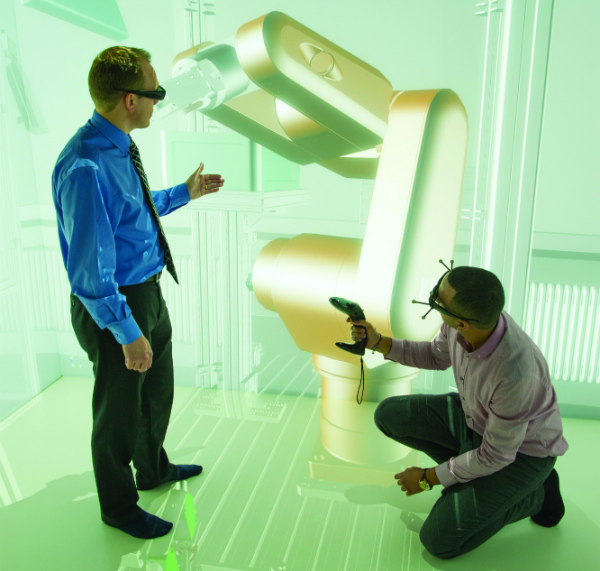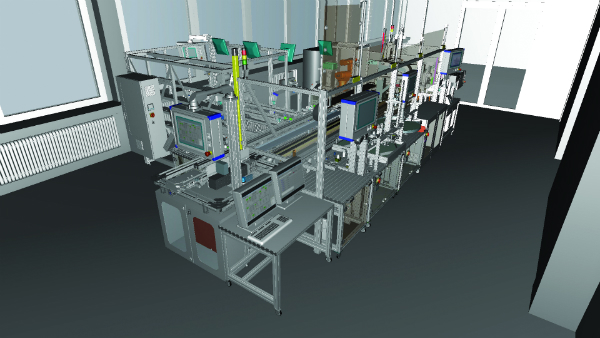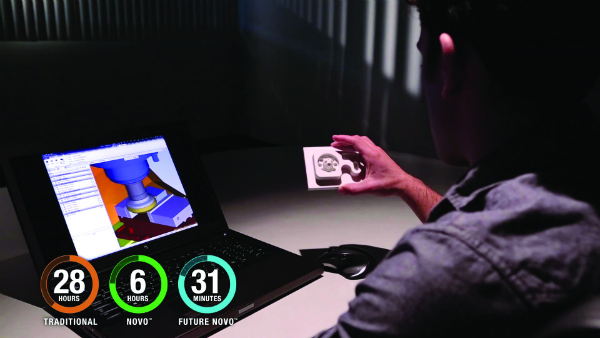Virtual reality is no longer a novelty or a gimmick; over the past five years, software development has seen it become a practical industry tool," states Paul Hetherington, senior research engineer (VR) – manufacturing simulation, at the Manufacturing Technology Centre (MTC) in Coventry.
Donning a pair of 3D glasses complete with motion sensors and stepping into the MTC's new digital factory demonstrator, it's easy to see why he makes this claim. Immersed in a 3D virtual reality environment, users can move through, duck under, hover over and rotate around uploaded 3D models of plants, production lines, machine tools, engine assemblies and so on. Siemens, the Electronic Systems Community (ESCO), automation trade association GAMBICA, Hewlett-Packard, Shadow Robotics and Ubisense were among the organisations that contributed to the project.
On the day of Machinery's visit, a 3D bottling plant was mimicking a continuous production environment, showing how, in the future, the mass customisation of consumer goods at low cost could be facilitated. Bottles enter the conveyor carrying a barcode, which, upon passing a reader, tells the line what to do. This could include type of contents, fill quantity, labelling and capping information, for example. The next bottle could conceivably carry an entirely different set of instructions. The bottling plant is just one of numerous 3D models that have been developed for demonstration purposes at the MTC.
 The virtual world allows full investigation and creation of production processes that can be created in the real world
AUTOMATION – THE IRONY
The virtual world allows full investigation and creation of production processes that can be created in the real world
AUTOMATION – THE IRONY
To understand why the digital factory demonstrator has been developed, the 'irony of automation' needs to be considered. The aim of automation is to reduce human input and save on costs but, if something goes wrong, a human is required to sort things out. To make matters worse, rectifying the situation is often so complicated that the human doesn't know what to do, hence the requirement for simulation.
With this in mind, the demonstrator will allow manufacturers, universities and key stakeholders to create production processes based on the latest technologies that help improve productivity, quality and energy efficiency. The digital factory demonstrator, also known as the Industry 4.0 demonstrator (see below), is said to be the first of its kind in the UK and is designed to showcase how a 'fourth industrial revolution' could shape the future of British manufacturing.
The demonstrator is viewed as the MTC's first step on the road to Industry 4.0. It is planned that the demonstrator might soon form part of a 'smart' factory, along with a supervisory control and data acquisition system such as SCADA or similar, and networking and connectivity capability to intelligent automation and production systems (not yet in place at the MTC).
 The 3D bottling plant that was being mimicked at the MTC. A continuous production environment, it demonstrates how, in the future, the mass customisation of consumer goods at low cost could be achieved
The 3D bottling plant that was being mimicked at the MTC. A continuous production environment, it demonstrates how, in the future, the mass customisation of consumer goods at low cost could be achieved
Beyond the smart factory, it is also intended that Industry 4.0 at the MTC will eventually support cloud-based manufacturing services, complete with ad hoc value chains. This means that, via the cloud, interested parties (essentially anyone with a part or product to make) could approach the MTC or others with similar 'smart' factories to engage 'manufacturing as a service'. Purchasing manufacturing capability and capacity via the cloud will save on capital expenditure, while for the facility owner it will create business (assuming it has spare capacity).
With all manufacturing data stored digitally in the cloud, job lists and production schedules could be confined to history. What's more, all data gathered during production could be used to support the digital model. Using the example of a machining cell, this could include cutting speed, feed rate, spindle speed, depth of cut, cycle time and so on. This information will be useful to aid future process improvements. Conceivably, it would also be simple to facilitate last-minute design changes, literally moments before the start button is pressed, by updating the digital model in the cloud.
As part of its Industry 4.0 remit, the MTC also aims to create a platform for 'manufacturing IT/software as a service'. Planned to be in place by the end of this year, the concept is said to "represent the integration of the real and virtual world".
SOFTWARE SERVICES IN THE CLOUD
"Essentially, those using the service will not purchase any software; they will use the software available on the platform to engage cyber-physical devices [see box] that are linked to the cloud," explains Harald Egner, EU & research partnership manager at the MTC. "Users would only pay for what they use, perhaps a nominal fee of around €300 per month, for example. Compare this to buying an MES [manufacturing execution system], which is expensive and also requires hardware and the use of skilled personnel, and the benefits are clear."
Ultimately, all existing and planned elements of Industry 4.0 at the MTC will become smart network nodes interconnected via a standardised network without any hierarchy. In effect, every sensor, every machine and every control system will be able to communicate with other elements of the network both horizontally and vertically. So, has this standardised network been defined yet? Well, maybe, in the shape of
Virtual Fort Knox (VFK).
"VFK, developed by the Fraunhofer Institute for Manufacturing Engineering and Automation, goes hand-in-hand with the Industry 4.0 initiative and we are negotiating to bring it to the MTC," says Egner. "We hope to have a platform to launch by the end of the year."
VFK is a cloud IT platform that aims to promote manufacturing IT as a service. It will allow independent software vendors (ISVs) to develop manufacturing IT solutions. And with these IT solutions provided from the cloud, end-customers can flexibly combine such services to create an ideal solution to their problem, says VFK's promoter. Fundamentally, it says, the platform enables manufacturing firms to procure individually optimised software services quickly, at an affordable price and at low risk.
For UK manufacturers wondering when all this is going to happen and whether they will be left behind, such concerns are at present unfounded. Industry 4.0 is still finding its feet, although it will certainly pay dividends to get savvy with the concept.
"Things cannot happen overnight," states Egner. "Most will start by connecting things on the shopfloor and build from there. It's about identifying the areas of biggest value, not about the whole company going digital in an instant. My advice for manufacturers is get prepared for Industry 4.0, because it is going to happen, particularly at OEMs and their supply chain partners. Getting ahead of the game could prove a real differentiator."
THE WAY AHEAD
For now, the digital factory at the MTC points the way ahead. Indeed, there are plans for it to become even more interactive in the near future. One of the project's stakeholders, Siemens, now wants to work with industry partners to build a full 'living laboratory' at the MTC, linking smart sensor technology to intelligent automation and production systems.
"The UK must invest in digital and smart factories, not least because the concept of Industry 4.0 plays to our strengths, and tackles many of the complex production and consumption challenges we face today," says Brian Holliday, managing director of Siemens' industrial activities in the UK. "By investing in these technologies, UK factories stand to achieve up to a 30% improvement in productivity."
Aware of the potential, Siemens is calling on the UK government to offer enhanced capital allowances, extending them to cover automation technology in the same way as they have been applied to energy-efficient technology, to stimulate investment and improve SME productivity. Siemens also plans to engage with the Manufacturing Advisory Service to develop an Industry 4.0 work stream.
 INDUSTRY 4.0: IS IT THE FUTURE, AND WHO'S IN?
Widia Novo, distributed by Kennametal, offers cutting tool data and expertise, online
INDUSTRY 4.0: IS IT THE FUTURE, AND WHO'S IN?
Widia Novo, distributed by Kennametal, offers cutting tool data and expertise, online
For those who haven't heard, the fourth industrial revolution, which some are referring to loosely as the 'internet of things', is about to commence. Called Industry 4.0, the concept is rapidly gathering a head of steam in Germany, where it originated, and is being driven by a steering committee comprising member companies, representatives of three professional associations (including VDMA, the German Machinery Association), and working group leaders. Indeed, the fact that the German government has already committed €200m to Industry 4.0 is a clear message to counterparts in the UK.
Those of a certain generation will be thinking we've been here before. Remember CIM (computer integrated manufacturing)? Quite. So, where does Industry 4.0 differ? For a start, although the internet of things means a world of connected devices in factories, offices and on the person, there is a further element to Industry 4.0 that sees connected machines, facilities or other mechanical actors being 'cyber-physical'. The latter means tight integration between a system's computational and physical elements, with this also implying autonomous decision-making capability.
Beyond manufacturing using cyber-physical systems, another service that could be supported by Industry 4.0 is 'smart products'. Such products would feature embedded systems/intelligence offering lifetime monitoring and customer feedback platforms. This is because the digital model will exist in parallel with its physical counterpart, tracking its service life and logging breakdowns, as well as scheduling maintenance, end-of-life recycling or disposal. From raw material batch number to the factory where it was recycled, all information will be retrievable.
So, is Industry 4.0 having an impact? Well, according to a recent survey by German IT firm Fistec, managers at engineering companies and component manufacturers currently estimate the relevance of Industry 4.0 as "moderate". Although opportunities are available, companies are clearly still finding their way.
"Industry 4.0 will become successful once its vision is turned into relevant and viable practical solutions," says Harald Egner, EU & research partnership manager at the Manufacturing Technology Centre. "Once a handful demonstrate the benefits, there will be wide scale buy-in."
In terms of technology providers getting ready for Industry 4.0, there's much to report. Siemens (0161 446 6400), for instance, has already stated that it is extending its preparations for Industry 4.0 to include the machine tool building industry with a series of integrated solutions.
On the subject of machine tools, sheet metal processing machine manufacturer LVD (01295 676800) was promising a new technology developed with Industry 4.0 in mind at the EuroBLECH exhibition in Hanover last month (not open at time of printing). The company was set to unveil a technology "that can transform a shopfloor, giving decision makers powerful, real-time insight of operations".
Elsewhere, sawing machine specialist Kasto (01908 571590) says it manufactures integrated sawing and handling cells using Industry 4.0 practices and focuses its R&D in this area, while machining centre producer Grob (0121 366 9848) claims it has already taken some initial concrete steps towards Industry 4.0 in co-operation with the automotive industry. "The objectives of the co-operation are to digitalise documentation, such as area use of the production halls and also to carry out process simulations," says German Wankmiller, chairman/CEO at Grob-Werke GmbH & Co KG.
Industry 4.0 also affects the tooling industry, a point not missed by Widia (Kennametal, 01384 401000) with its recently introduced Novo: Digital Widia Knowledge (see also p27). Widia says that large opportunities exist through the digital integration of accurate, complete tool data, rules and application knowledge to dramatically rethink and shorten process planning. This is what Widia envisions with its Novo desktop and tablet application – on-demand delivery of cutting tool data and expertise for reduced product development and manufacturing lead-times.






